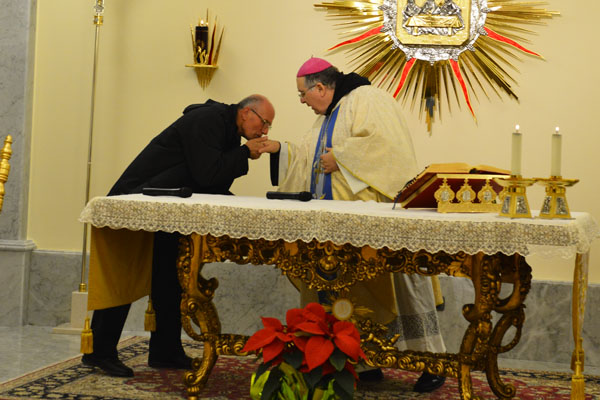A maze of alleys and a network of wrinkles embedded in churches and the remains of ancient convents wounded by the succession of earthquakes and floods, granite stone portals that open onto old buildings, illuminated at dusk, by the amber glow of artistic street lamps. It is Placanica, a town in the Ionian Reggio Calabria, at 250 meters above sea level, 132 km from Reggio Calabria and about 10 from the SS 106.
In one of these modest houses, in the hamlet of ‘Santa Domenica’, on 27 January 1950 at around 8.00 , Cosimo Fragomeni was born , the eldest son of two children of the spouses Ilario Fragomeni and Maria Mazzà, humble people, committed to cultivating the land, but serene and confident in the help of Providence.
A small fraction of the municipality of Placanica, Santa Domenica, about 5 km from the center, at the time, was reachable on foot or on the back of a donkey, through a mule track that is innervated in the ‘Precariti’ valley which cuts the entire municipal territory in half, an anonymous village ‘wounded’ by the mass exodus that had torn and carried away thousands of young Calabrians forced to abandon their affections and small patches of land, in search of work and dignity. people who remained had reacted to the fatigue of living with pride and determination, necessary to the provocations of an existence of hardship and with a strong rootedness in the faith that translated into widespread solidarity. And it was precisely in this family, where mutual respect and peace reigned, that little Cosimo found the deep Christian roots that nourished in the most intimate folds of his soul an early yearning for holiness and the vocation to Christian piety.
When Cosimo had completed the first month of life, for baptism, it was his grandparents who took him to the mother church dedicated to San Basilio Magno, close to which part of the town developed: ” The Fragomeni lived outside the town in a very poor house and when we went to fetch it, the stream was in full flood. “- said Fioravante Monterosso, a few years before her death -” The mother, according to the tradition of those times, could not go to church after giving birth until a certain period of time had passed and, therefore, my wife and I went in church to act as godparents ”.
The childhood of little Cosimo passes in serene simplicity while his mother, a pious and humble woman, who educates him in the Christian faith and virtues, is not slow to understand that his is not a child like the others. Although he soon knows the hardness of life, Cosimo is an obedient and good child, who willingly shares the effort and work of his loved ones by helping his father to look after the flock between clearings and countryside crossed by stony paths smoothed by the rain and burnt by the sun and where, in the solemn stillness of nature, he begins to pray and meditate. One of the most surprising aspects of his earliest years was, in fact, the special intimacy he had with the Mother of God and the precocity with which he corresponded to grace: so many extraordinary and prodigious circumstances that marked his green age,
As he grew in grace, comforted as he was by the example of the virtues of his parents, Cosimo already seemed to yearn for an ideal of an ascetic life. A soul stretched upwards that already vibrated with a special intimate spiritual passion. Mystical experiences reported faithfully and in detail in about thirty letters, in some of which Cosimo Fragomeni tells of the apparitions of the Immaculate Virgin, which took place, from 11 to 14 May 1968, at dusk, while he was about to return home after a day of hard work in the fields on a huge boulder covered by bushes and brambles which has since become ‘Lo Scoglio delle apparizioni’, an incessant pilgrimage destination. An extraordinary experience that inflamed the heart of the young man with love, at the age of eighteen, who, accepting in faith the indications that Our Lady entrusted to him through four messages addressed to the whole of humanity, began the extraordinary work of evangelization for the salvation of sinners. An epiphany of grace, which transformed the humble farmer into a witness of Christian charity, capable of speaking to the hearts of the people.
A constant exercise in holiness that Cosimo, especially in the evening, continues in his cold and damp room (which will undermine his young body already tried by fasting and mortification) and which will become a privileged place for many extraordinary mystical manifestations, always referred to by the young Don Rocco Gregorace, (a priest of Placanica at the time) who was the first to have the privilege of knowing his confidences. Although he is uneducated (to help Cosimo in his family, he will be forced to interrupt his studies in the sixth grade), his language stands out for its theological subtleties and erudite jargon. A freshness of language, concise and direct, which penetrates into the
the most intimate folds of the soul and induces the sinner to review his behavior to put his existence back on the right path. Compared for his prophetic and thaumaturgical virtues to the Saint of Pietrelcina, the extraordinary life of the humble peasant, who became brother Cosimo for all, after having chosen the hard path of penance and prayer, in particular of that prayer so pleasing to the Madonna, the Holy Rosary, testifies to the profound union with the suffering Christ which is manifested in a loving charity towards the sick. A life, his, entirely Marian, spent in the service of the Truth; and in fact, in so many years of courageous proclamation of the Gospel, with the invitation to build one’s life on Christ, Brother Cosimo invoked, for many sinners, the miracle of conversion and healing for many suffering.


